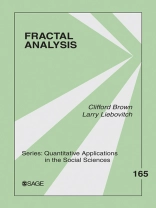A specialized presentation of fractal analysis oriented to the social sciences
This primer uses straightforward language to give the reader step-by-step instructions for identifying and analyzing fractal patterns and the social process that create them. By making fractals accessible to the social science students, this book has a significant impact on the understanding of human behavior.
This is the only book designed to introduce fractal analysis to a general social science audience.
Table des matières
About the Authors
Series Editor′s Introduction
Preface
Chapter 1. Introduction to Fractal Analysis
Mandelbrot
What Are Fractals?
Fractal Dimension: Quantifying Fractal Properties
The Formal Definition of Fractals
Discussion
Chapter 2. Fractal Analysis of Frequency Distributions
Power Laws
Summary
Chapter 3. Fractal Patterns Embedded in Two Dimensions
Estimating the Fractal Dimension of Empirical Data
Summary and Discussion
Chapter 4. Social Processes That Generate Fractals
How We Do Our ‘To Do’ Lists: Preferential Priorities
How We Kill: Attendant Causes, Self-Organized Criticality, and Agent-Based Models
How We Network: Preferential Attachment
How We Decide Where to Live: Diffusion Limited Aggregation
How We Look for Food: Lévy Flights
How We Live Together: Balancing Cohesive and Disruptive Forces
Summary and Discussion
Chapter 5. Advanced Topics in Fractal Analysis
Multiscaling Fractal Patterns
Patterns Embedded in Three Dimensions
Self-Affine Fractals
Fractal Time Series
Multifractals
Lacunarity
Conclusion
Chapter 6. Final Considerations
Should I Try Fractal Analysis?
References
Author Index
Subject Index
A propos de l’auteur
Dr. Larry S. Liebovitch was awarded a B.S. in physics summa cum laude from the City College of New York and his A.M. and Ph.D. in astronomy from Harvard University. He has published articles on fractal and nonlinear analysis in biophysical, medical, and psychological systems. He teaches both undergraduate and graduate classes in psychology, interdisciplinary science, and mathematics at Florida Atlantic University. Among his undergraduate courses are Applications of Fractals to Psychology for psychology students.












